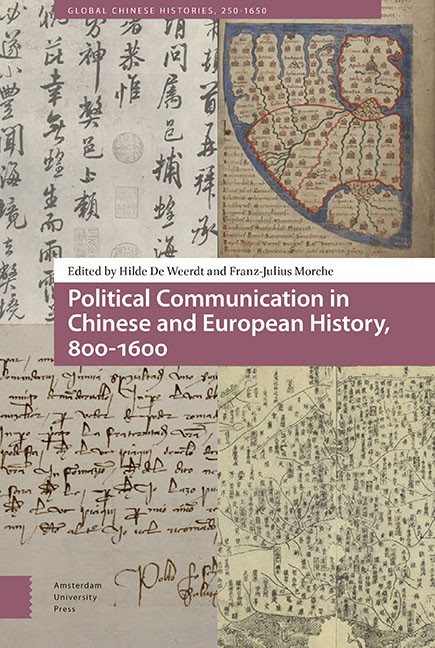Book contents
- Frontmatter
- Dedication
- Contents
- List of Figures and Tables by Chapter
- Acknowledgments
- Introduction
- Part I Communication and the Formation of Polities
- Part II Letters and Political Languages
- Part III Communication and Political Authority
- Part IV Memory and Political Imaginaries
- Epilogues
- List of Contributors
- Index
12 - Imaginaries of Empire and Memories of Collapse: Parallel Narratives in Southern Song and Byzantine Commemorations of Conquered Capitals
Published online by Cambridge University Press: 17 June 2021
- Frontmatter
- Dedication
- Contents
- List of Figures and Tables by Chapter
- Acknowledgments
- Introduction
- Part I Communication and the Formation of Polities
- Part II Letters and Political Languages
- Part III Communication and Political Authority
- Part IV Memory and Political Imaginaries
- Epilogues
- List of Contributors
- Index
Summary
Abstract
Producing parallel narratives of the fall of Kaifeng in 1127 and the sack of Constantinople in 1204, Ye Mengde 葉夢得 (1077–1148) and Niketas Choniates (c.1155–1217) chronicled the collapse of these imperial centres in an effort to reconstruct post-conquest political communities in exile. While Ye and Niketas were deploying different conceptual frameworks of political authority and literary blueprints for memoirs, their writings documented personal displacement as well as cultural and political trauma writ large. By recording and commemorating the chain of events that culminated in the collapse of the Northern Song and Byzantine Empires, both authors were converting oral anecdotes into cultural memory. Ye and Niketas devised ex post facto explanations for the fall of Kaifeng and Constantinople as the consequence of the actions of failed monarchs and corrupt courtiers — and, to a lesser extent — the forces of divine punishment.
Keywords: Ye Mengde, Niketas Choniates, Kaifeng, Constantinople, imperial collapse, cultural memory
After Jurchen invaders from Inner Asia besieged and conquered Kaifeng in 1126–1127, and Constantinople fell to the Latin armies of the Fourth Crusade in 1204, political information about these courts and capitals was preserved and retransmitted by elite scholars, whose accounts of imperial collapse circulated amongst communities of diasporic literati. Producing parallel narratives of the fall of Kaifeng and the sack of Constantinople, Ye Mengde 葉夢得 (1077–1148) and Niketas Choniates (c.1155–1217) chronicled the collapse of these imperial centres in an effort to reconstruct post-conquest political communities. While Ye and Niketas were operating within separate conceptual frameworks of imperial authority and structuring their narratives according to different literary blueprints, their surviving memoirs documented personal displacement as well as cultural and political trauma writ large. By recording and commemorating the chain of events that culminated in the collapse of the Northern Song and Byzantine Empires from exile, both authors were converting orally transmitted anecdotes into enduring textual representations; in other words, they were transmuting communicative memory into cultural memory. Braiding dynastic history with personal recollection, their texts commemorated the breaching of imperial frontiers by ‘barbarian’ invaders, who had dislocated educated men like themselves into the hinterland, where dispersed networks of elites could be reconnected through the sharing of narratives about the recent dynastic past.
- Type
- Chapter
- Information
- Publisher: Amsterdam University PressPrint publication year: 2021



